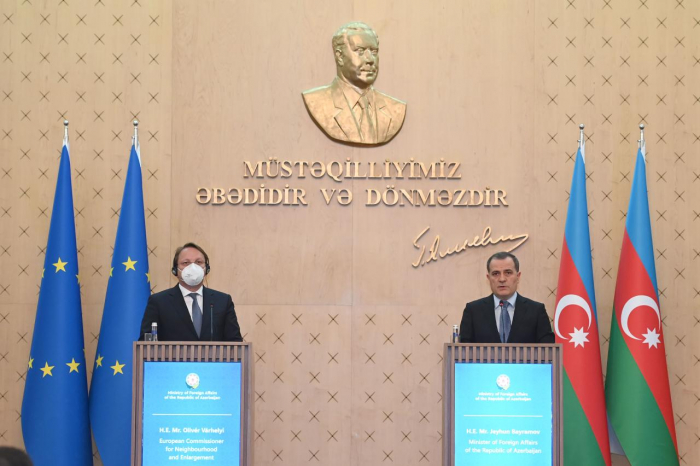On February 4, the leaders of Armenia and Azerbaijan met online with the mediation of France’s President Emmanuel Macron and the President of European Council Charles Michel. Reportedly, President Macron joined the meeting as his country currently holds the presidency of the European Union (EU); i.e., not in his capacity as one of the Co-Chairs of the Minsk Group of the OSCE – the institution that was established in 1992 to coordinate the Armenia-Azerbaijan conflict over the formerly occupied territories of Azerbaijan. This summit coincided with the Advisory Council of Southern Gas Corridor which was held in Baku on the same day with the attendance of two European Commissioners - Commissioner for Neighborhood and Enlargement Oliver Varhelyi and Commissioner for Energy Kadri Simson.
The summit of the leaders and the statements made by the Commissioners in Baku are, for several reasons, of great importance for the peace process between Armenia and Azerbaijan after the Second Karabakh War of 2020, and for the role of the EU in the region. Above all, they demonstrated that the EU has opted to engage with Armenia and Azerbaijan in a more balanced form paying commensurate attention to their individual concerns and expectations. This is an important policy shift in the EU engagement with the South Caucasus, and in particular with the normalisation process of the Armenia-Azerbaijan relations.
Until the latest months, the EU was criticized in Azerbaijan for reviving the pre-war agenda in Armenia-Azerbaijan relations. For example, Baku was displeased by the statements of the EU officials that suggested to involve Minsk Group into the peace process or to resolve the status of “Nagorno-Karabakh” implying that the conflict cannot be resolved without an agreement on the status issue. For Baku, the Minsk Group should have no role in the present peace process as long as they stick to the pre-war agenda, since Baku considers the conflict as “resolved” and expects the Minsk Group to come up with new proposals to address post-war issues and initiatives. Likewise, Azerbaijan refuses to discuss the status of “Nagorno-Karabakh”, because, for Baku, the region that this outdated name refers to had been already recognised by the United Nations Security Council (1993) as part of sovereign territories of Azerbaijan.
Azerbaijan criticized the EU also for disregarding the massive financial needs for demining and reconstruction of the liberated Karabakh region in its newly-adopted investment plan for the Eastern Partnership countries: in its recent aid package for the Eastern Partnership countries – which was confirmed during President Michel’s visit to the South Caucasus in July 2021 – the EU allocated substantially less aid for Azerbaijan (140 million euros) than Georgia (3.9 billion euros) and Armenia (2.6 billion euros). The EU failed to provide a convincing explanation for this discrepancy, which raised questions about the true nature and objectives of the investment package.
The statement shared by the European Council President Michel and French President Macron following the February 4 meeting, as well as those voiced by President Aliyev and Prime Minister Pashinyan demonstrated some notable changes in the above-mentioned issues.
First, according to the media reports and the statements of the leaders, all the topics discussed at the summit referred to the post-conflict period. Neither the European leaders nor their Caucasian counterparts raised the “pre-war” issues like the revival of the Minsk Group and the settlement of the status issue. After a period of hesitation, the EU finally adjusted its engagement with the agenda of the Russia-mediated Moscow and Sochi meetings of Armenian and Azerbaijani leaders. The statement of President Michel and President Macron focused primarily on the efforts for reducing tensions, building trust, as well as the restoration of regional transportation links.
This approach was also noticed in the speeches of Commissioner Varhelyi in Baku. In a press conference with the Azerbaijani Foreign Minister, he voiced the EU’s readiness to support the reconciliation efforts aimed at reducing tensions “after the conflict between the two parties”. In a similar way, he also declared the EU’s readiness to provide technical support in the process of delimitation and demarcation of borders, as well as in the issue of demining”.
The second remarkable change in the EU policies was noticed with respect to the investment plan in the South Caucasus. Commissioner Varhelyi, in the course of his Baku visit, announced that a financial package amounting to 2 billion euros was allocated to Azerbaijan within the framework of the economic investment plan. He said the sides are considering the implementation of specific projects including those for the recovery and reconstruction process in Azerbaijan. The EU’s decision to support Azerbaijan’s economy and its reconstruction efforts in the Karabakh region is likely to have a positive impact on EU-Azerbaijan relations and the negotiations over the new framework agreement which the sides have been discussing since 2017.
In general, the EU’s reconsideration of its policies towards Armenia and Azerbaijan and its pursuit of a more balanced approach is likely to buttress the EU’s place in the post-war peace process and help it to play a more impactful mediating role. If successful, this promises to have larger regional, and possibly geopolitical implications, for the South Caucasus, since the Armenia-Azerbaijan peace negotiations have so far been pursued mainly through the sole mediation of Russia.
Vasif Huseynov is a Senior Advisor at the Center of Analysis of International Relations (AIR Center), Baku, Azerbaijan.
More about: Azerbaijan European-Union
















































